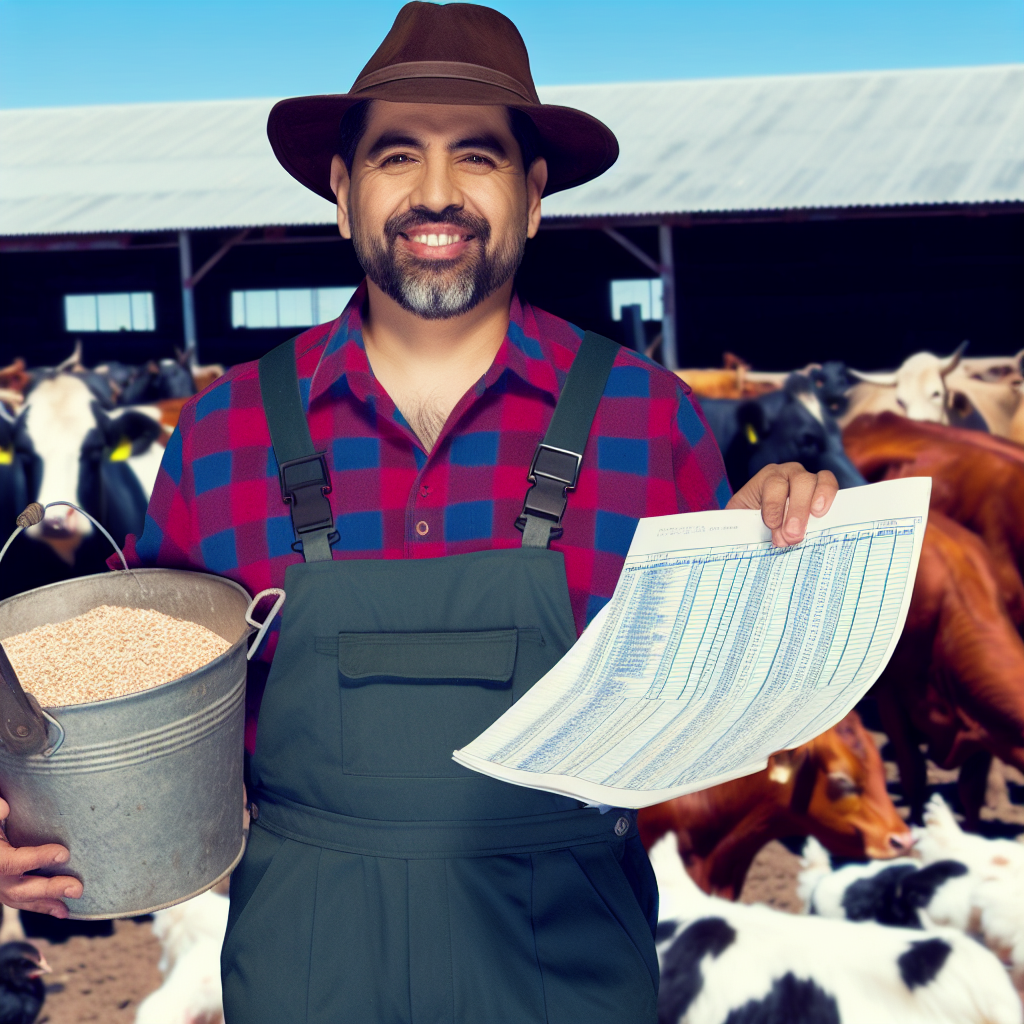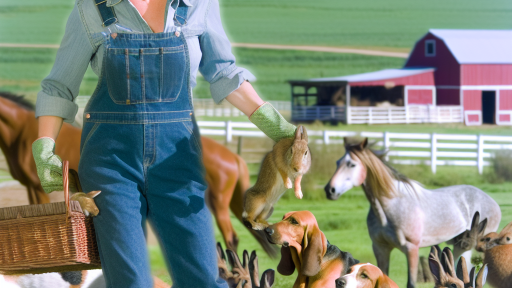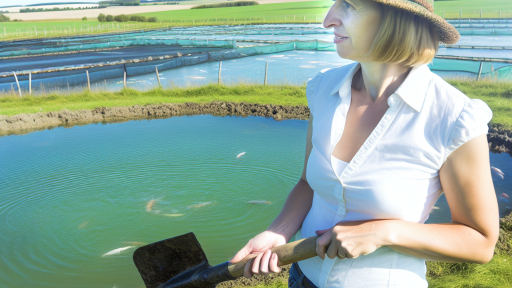Introduction
Sustainable livestock farming involves raising animals in a manner that is environmentally sound, socially responsible, and economically viable.
It seeks to minimize the environmental impact of farming while ensuring animal welfare and profitability.
Balancing animal welfare and profit is crucial for farmers in today’s society.
Ethical consumers increasingly demand humane treatment of animals.
Meeting these expectations can enhance marketability and boost profits.
Additionally, improving animal welfare often leads to better productivity and healthier livestock.
Current livestock farming practices face numerous challenges.
Climate change affects feed availability, water resources, and grazing land.
Farmers must adapt to these fluctuations while managing costs.
Decreasing biodiversity and growing public scrutiny further complicate operations.
Many farmers strive to implement sustainable practices amidst these pressures.
To successfully navigate these challenges, farmers can adopt innovative strategies.
Integrating regenerative agriculture techniques can enhance soil health and increase resilience.
Implementing rotation grazing systems can promote healthy pastures and improve animal welfare.
By managing resources better, farmers can reduce waste while increasing profit margins.
Transform Your Agribusiness
Unlock your farm's potential with expert advice tailored to your needs. Get actionable steps that drive real results.
Get StartedConsumers play a significant role in promoting sustainable livestock farming.
They can demand transparency, support ethical brands, and choose products certified for animal welfare.
This shift in consumer preference presses producers to adopt better practices.
Consequently, a positive cycle emerges, benefiting both animals and farmers.
Moreover, technology offers numerous solutions for sustainable practices.
Precision farming tools help optimize feed efficiency and minimize resource use.
Data analytics can inform breeding decisions, leading to healthier and more productive animals.
These innovations promote responsible farming while enhancing profit potential.
Sustainable livestock farming requires a committed approach to balancing animal welfare and profit.
By adapting to challenges and embracing innovation, farmers can improve both their livelihoods and the wellbeing of their animals.
A sustainable future for livestock farming depends on collective efforts from producers, consumers, and policymakers alike.
Sustainable Livestock Farming: An Essential Practice
As the global population continues to rise, sustainable livestock farming emerges as an essential practice.
This method prioritizes animal welfare while ensuring profitability and environmental health.
Understanding the core principles of sustainable livestock farming aids in addressing current and future challenges in the sector.
Understanding Sustainable Farming Practices
Sustainable livestock farming refers to practices that maintain productivity while safeguarding environmental and animal health.
Key principles include:
- Resource Efficiency: Utilizing resources such as land, water, and feed effectively ensures lower waste and higher productivity.
- Diverse Farming Systems: Integrating crops and livestock improves biodiversity and minimizes disease risks.
- Animal Welfare: Providing humane conditions leads to healthier animals and better product quality.
- Soil Health Management: Practices like rotational grazing enhance soil fertility and reduce erosion.
- Minimal Use of Chemicals: Reducing chemical inputs promotes environmental balance and healthier ecosystems.
Each of these practices enhances the resilience of agricultural systems while producing livestock sustainably.
Farmers increasingly adopt them for long-term viability.
The Role of Environmental Stewardship in Livestock Farming
Environmental stewardship plays a vital role in sustainable livestock farming.
By adopting responsible practices, farmers can maintain the ecological balance and ensure that their operations do not deplete natural resources.
Key aspects include:
- Reducing Carbon Footprint: Sustainable practices can significantly lower greenhouse gas emissions associated with livestock production.
- Water Conservation: Efficient water use and management minimize waste and protect local water sources.
- Biodiversity Preservation: Maintaining diverse ecosystems supports natural predators and beneficial organisms, reducing pests and diseases.
- Waste Recycling: Utilizing animal waste as fertilizer reduces chemical inputs and enhances soil quality.
- Habitat Preservation: Sustainable farms protect surrounding ecosystems, creating a balanced agricultural environment.
Implementing these stewardship principles fosters a holistic approach to livestock farming.
It prioritizes the health of the planet, as well as the animals within the system.
Benefits of Sustainable Methods for Long-term Viability
Implementing sustainable livestock farming practices yields numerous benefits.
Showcase Your Farming Business
Publish your professional farming services profile on our blog for a one-time fee of $200 and reach a dedicated audience of farmers and agribusiness owners.
Publish Your ProfileThese advantages extend beyond immediate profits to support long-term viability for farmers and the environment.
Key benefits include:
- Enhanced Animal Health: Improved living conditions lead to healthier animals, reducing veterinary costs and improving productivity.
- Increased Profitability: Reducing resource inputs and waste lowers production costs, positively impacting profits.
- Market Demand: Consumers increasingly prefer sustainably-raised products, allowing farmers to access premium markets.
- Improved Soil Fertility: Sustainable methods enhance soil health, reducing the need for synthetic fertilizers.
- Resilience to Climate Change: Diverse and well-managed systems adapt better to climate variations, ensuring stable production.
As livestock farmers adopt sustainable practices, they become better prepared for future uncertainties.
Sustainability not only addresses current challenges but also positions farmers favorably in an evolving market.
Moreover, sustainable livestock farming contributes to global food security.
As the agricultural sector faces increasing pressures, it becomes imperative to optimize productivity without compromising ethical standards.
The transition toward sustainable farming necessitates education and support for farmers.
Various organizations and initiatives provide resources to facilitate this shift.
By emphasizing research and innovation, stakeholders can address knowledge gaps in sustainable practices.
Engaging in community discussions also fosters collective learning experiences.
Farmers share successful strategies, challenges, and solutions that enhance the overall understanding of sustainable livestock farming.
Incorporating sustainable practices into daily operations requires initial investments and effort.
However, the long-term rewards far outweigh the costs.
Therefore, it is essential to see the transition as not just an option but a necessity for future farming success.
Understanding sustainable livestock farming involves recognizing its core principles, the significance of environmental stewardship, and the numerous benefits for long-term viability.
This approach not only promotes animal welfare but also supports profitability and environmental health.
With the global food system facing immense pressure, sustainable livestock farming stands as a beacon of hope for a balanced agricultural future.
Farmers who embrace sustainable methods drive the industry towards a more responsible and ethical approach to livestock farming.
By implementing practices that align with both ecological sustainability and economic viability, they position themselves for future success.
Animal Welfare: The Ethical Imperative
Definition of Animal Welfare in the Context of Livestock Farming
Animal welfare refers to the physical and mental well-being of animals.
In livestock farming, it encompasses various aspects of care and handling.
Farmers must ensure that animals lead a life free from stress and suffering.
This involves providing them with a suitable living environment and adequate nutrition.
Animal welfare is increasingly viewed as a fundamental ethical obligation.
It requires a commitment to treat animals with respect and understanding.
Farmers implementing welfare measures often see positive long-term impacts.
Healthy, content animals yield better productivity and sustainability.
Current Animal Welfare Standards and Regulations
Numerous standards and regulations guide animal welfare in livestock farming.
These standards can vary by region and are influenced by cultural and societal values.
- International Guidelines: The World Organisation for Animal Health sets standards globally.
- National Regulations: Countries often have specific laws governing animal treatment.
- Industry Certifications: Many industry organizations provide certification programs for farmers who meet welfare benchmarks.
Each of these regulations aims to ensure the humane treatment of animals.
They often address housing, feeding, health care, and handling practices.
Compliance with these standards is essential for livestock farmers.
Non-compliance can lead to significant penalties and loss of market access.
The Impact of Poor Welfare on Animal Health and Productivity
Ignoring animal welfare has dire consequences.
Poor welfare directly impacts both animal health and overall farm productivity.
Research shows that animals in stressful environments are more susceptible to illness.
Health problems often arise from inadequate housing and nutrition.
Additionally, the productivity of poorly cared-for animals significantly declines.
Low milk production, decreased weight gain, and increased mortality rates follow.
When animals experience stress, they also exhibit undesirable behaviors.
Showcase Your Farming Business
Publish your professional farming services profile on our blog for a one-time fee of $200 and reach a dedicated audience of farmers and agribusiness owners.
Publish Your ProfileThese behaviors can lead to injuries and further health complications.
Consequences of Ignoring Animal Welfare
Ignoring animal welfare standards results in adverse effects not just on animals but also on farmers.
Environmental, economic, and social perceptions suffer as a consequence.
- Economic Loss: Poor health leads to lower productivity and higher veterinary bills.
- Market Reputational Damage: Consumers increasingly seek ethically-produced products.
- Legal Issues: Farmers can face lawsuits and inspections from regulatory agencies.
Farming practices that disregard welfare are often unsustainable in the long term.
Instead of thriving, such operations face increased scrutiny and potential closure.
Promoting Animal Welfare on Farms
Farmers play a crucial role in promoting animal welfare.
They can implement effective strategies to not only improve animal well-being but also enhance profitability.
- Good Housing Conditions: Provide animals with spacious, clean, and enriched living environments.
- High-Quality Nutrition: Ensure access to balanced diets tailored to the specific needs of each species.
- Regular Health Checks: Conduct routine veterinary examinations to detect and treat issues early.
- Training for Workers: Educate farm staff on handling animals humanely and how to recognize signs of distress.
Incorporating these practices into daily operations fosters a culture of care and respect for animals.
Farmers can significantly reduce suffering while enhancing productivity.
Benefits of Prioritizing Animal Welfare
Investing in animal welfare ultimately benefits farmers and animals alike.
The positive outcomes are numerous and far-reaching.
- Better Animal Health: Healthy animals are more productive and resilient.
- Increased Productivity: Animals that are well-cared-for produce more milk, meat, and eggs.
- Higher Quality Products: Welfare-friendly farming often results in superior quality animal products.
- Stronger Market Position: Ethically sourced products can attract conscientious consumers.
Farmers that embrace ethical practices build a reputation for quality.
Enhanced animal welfare leads to economic viability and consumer loyalty.
Animal Welfare as a Path Forward
Achieving success in livestock farming requires a balanced approach.
This balance must prioritize animal welfare while ensuring profit and productivity.
Adopting welfare-friendly practices is not merely an ethical choice.
It serves as a business strategy that pays off in the long run.
Farmers must remain vigilant and adaptable to evolving standards.
They should continually assess their practices and make decisions that reflect ethical responsibilities.
By embracing animal welfare, farmers contribute to a sustainable future.
Together, they create a system that nurtures animals, the environment, and the economy.
Explore Further: Advanced Breeding Technologies for Modern Farmers
Economic Implications of Sustainable Practices
Adopting sustainable livestock farming methods may require upfront investments.
Farmers may encounter costs related to:
- Infrastructure modifications
- Training and education for employees
- Purchasing organic feed
- Implementing animal welfare improvements
- Technology investments for monitoring
Despite these initial costs, sustainable practices often yield long-term economic benefits.
Cost savings can arise from:
- Reduced veterinary bills through improved animal health
- Lower feed costs through efficient resource management
- Increased productivity as animals thrive in better conditions
- Access to premium markets for sustainably-raised products
Farmers who invest in sustainable practices witness enhanced resilience against market volatility.
By diversifying their operations, they can reduce dependency on a single income source.
Case Studies of Profitable Sustainable Operations
Real-world examples highlight the viability of sustainable livestock farming.
These case studies demonstrate how successful farmers achieved profitability while prioritizing sustainability.
Case Study 1: Polyface Farms
Located in Virginia, Polyface Farms operates under a regenerative agricultural model.
They focus on rotational grazing and integrate multiple livestock species.
This method increases soil fertility and reduces reliance on chemical fertilizers.
Resulting benefits include:
- Lower operating costs due to reduced inputs
- High demand for pasture-raised meat products
- Consistent yearly profits even during market fluctuations
Case Study 2: The Good Farm
The Good Farm in California showcases how alternative proteins can be profitable.
They produce plant-based protein products while maintaining sustainable practices.
This operation has recently witnessed exponential growth due to rising consumer demand.
Their benefits include:
- Lower environmental impact compared to traditional livestock farming
- Attracting health-conscious consumers looking for alternatives
- Grants for research and development of sustainable products
Financial Incentives for Adopting Sustainable Practices
Governments worldwide recognize the need to promote sustainable agriculture.
Various financial incentives help farmers transition to sustainable practices.
Showcase Your Farming Business
Publish your professional farming services profile on our blog for a one-time fee of $200 and reach a dedicated audience of farmers and agribusiness owners.
Publish Your ProfileTypes of Financial Incentives
Farmers can access numerous financial resources:
- Grants: Government programs provide financial assistance for specific sustainable initiatives, such as renewable energy implementation.
- Subsidies: Some programs help offset the costs of organic certification or sustainable feed procurement.
- Tax Credits: Farmers may earn tax incentives for participating in conservation projects or reducing emissions.
- Low-Interest Loans: Programs offer affordable financing options for sustainability-related investments.
The Role of NGOs and Non-profits
Many non-governmental organizations also play a critical role.
They provide financial assistance, technical support, and training for farmers.
NGOs often focus on:
- Resource optimization
- Accessing new markets
- Education on sustainable practices
Through these avenues, farmers receive crucial in-kind support and training, enabling them to succeed economically.
The Value of Sustainable Branding
Investing in sustainable practices allows farmers to create strong brands.
Many consumers prioritize ethically produced food.
Sustainable branding can lead to:
- Increased customer loyalty
- Higher profit margins for premium products
- Opportunities for direct-to-consumer sales through farmers’ markets
Farmers who effectively communicate their sustainable practices can capture the attention of responsible consumers.
Engaging storytelling can translate into stronger market positioning.
Sustainable Livestock Farming Opportunities
Sustainable livestock farming presents numerous economic opportunities.
While there are initial costs, the potential benefits far outweigh them.
Successful case studies show that profitability and sustainability can coexist.
The availability of financial incentives further encourages adaptation to sustainable practices.
Ultimately, embracing sustainable livestock farming practices leads to improved animal welfare, ecological preservation, and economic resilience.
Farmers willing to invest in their future can create a thriving, sustainable operation while contributing positively to the environment and society at large.
Delve into the Subject: Key Genetic Traits to Consider in Breeding
The journey to sustainable livestock farming is often daunting.
Farmers face numerous challenges when they strive to implement sustainable practices.
Transitioning to these practices requires careful consideration of many factors.
Common Obstacles Farmers Face
Transitioning to sustainable practices often presents farmers with significant hurdles.
These obstacles can vary based on location, economic situation, and community values.
However, the following points highlight the most prevalent challenges faced by farmers:
- Lack of Knowledge and Skills: Many farmers simply lack the necessary training.
- Financial Constraints: The upfront costs of transitioning to sustainable practices can be substantial.
- Access to Resources: Transitioning often requires new technologies and resources.
- Market Demand and Access: Farmers may struggle to find markets for sustainably raised products.
- Regulatory Challenges: Compliance with government regulations can create obstacles.
Resistance to Change Within Traditional Farming Communities
Farming communities often exhibit strong traditional values.
This resistance to change poses a significant barrier to sustainable livestock practices.
Several factors contribute to this reluctance:
- Deep-Rooted Traditions: Many farmers have practiced traditional methods for generations.
- Fear of the Unknown: Farmers may fear that new methods could disrupt their livelihoods.
- Community Pressure: Peer influences play a major role in farming decisions.
- Perception of Increased Labor: Sustainable practices may seem more labor-intensive.
- Stigma of New Technologies: Some farmers view new technologies skeptically.
Economic Pressures vs. Ethical Considerations
Transitioning to sustainable livestock farming involves balancing economic pressures with ethical considerations.
This tug-of-war can be challenging for many farmers.
Below are some key points illustrating the complexity of this dilemma:
- Profit Margins: Many farmers operate on tight profit margins.
- Market Volatility: Livestock prices can fluctuate dramatically.
- Consumer Expectations: Farmers face pressure from consumers to adopt sustainable practices.
- Cost-Benefit Analysis: Farmers must evaluate the trade-offs associated with sustainability.
- Access to Financial Support: Limited access to grants, loans, or subsidies can hinder farmers.
Understanding these challenges helps frame the discussion on sustainable livestock farming.
Overcoming these barriers is essential for balancing animal welfare and profit.
This ensures a viable future for all stakeholders involved.
As the world increasingly values sustainability, addressing these challenges becomes more urgent.
The future of livestock farming may depend on innovative solutions that bridge these gaps.
With support from communities, governments, and consumers, farmers can embrace more sustainable methods.
This transition promises not only animal welfare but also long-term profitability and environmental health.
Gain More Insights: Revolutionary Livestock Management Tools Every Farmer Should Know
Innovative Solutions in Livestock Farming
In the rapidly changing world of livestock farming, innovative solutions play a vital role.
Farmers seek ways to improve animal welfare while ensuring profitability.
With technology evolving every day, we witness remarkable changes in livestock management.
The integration of new technologies enhances both animal welfare and profit margins.
Showcase Your Farming Business
Publish your professional farming services profile on our blog for a one-time fee of $200 and reach a dedicated audience of farmers and agribusiness owners.
Publish Your ProfileAdvancements in Technology
Precision agriculture offers livestock farmers the tools needed to monitor their animals closely.
This innovative technique allows for targeted interventions.
Instead of a one-size-fits-all approach, farmers can tailor care to individual animal needs.
The following technologies are revolutionizing animal husbandry:
- Welfare Monitoring Systems: These systems track animal health and well-being in real time. Sensors and wearable devices provide farmers with valuable data.
- Automated Feeding Systems: These systems ensure livestock receives optimal nutrition tailored to their needs. Automated feeders reduce labor and ensure consistent feeding schedules.
- Genetic Management Tools: These tools help farmers select the best breeds for high welfare standards. Enhanced genetic traits promote better health and productivity.
- Climate Control Solutions: Maintaining an ideal environment for livestock improves comfort and productivity. Innovative ventilation and heating systems prevent heat stress in animals.
Case Studies of Successful Integration
Many farms worldwide have successfully integrated technology into their practices.
These case studies illustrate the positive impact of innovation on animal welfare:
- Farm A: This dairy farm implemented a welfare monitoring system. Sensors tracked cow behavior and health, enabling quick interventions for any issues. As a result, the farm saw a decrease in veterinary costs and increased milk production.
- Farm B: A poultry farm adopted automated feeding systems. The new technology improved feed conversion rates and reduced feed waste. Consequently, profits rose while maintaining high animal welfare standards.
- Farm C: This beef operation invested in genetic management software. By selecting superior genetics, the farm produced healthier animals. Improved health led to lower mortality rates and higher profit margins.
- Farm D: A sheep farm utilized climate control solutions. Proper ventilation reduced heat stress during hot months. As a result, the flock exhibited better overall health and productivity.
The Role of Consumer Demand
Consumer demand significantly impacts livestock farming practices.
Nowadays, buyers increasingly prioritize animal welfare.
This shift in consumer preferences fuels market opportunities for farmers.
Understanding this trend helps farmers innovate and satisfy market needs:
- Transparency: Consumers demand information about farming practices. They want to know how animals are treated and raised. This pressure encourages farmers to adopt more humane practices.
- Certification Programs: Welfare certifications boost consumers’ confidence in product quality. Programs like Certified Humane or Animal Welfare Approved reward higher welfare standards.
- Direct-to-Consumer Sales: Farmers use platforms like farmer’s markets and online stores to sell products. These channels allow farmers to build brand loyalty and connect with informed consumers.
- Value-Added Products: There is a growing market for organic and pasture-raised meats. Farmers who invest in such practices can often charge premium prices.
Increasing Profitability through Innovation
Implementing innovative practices enhances farm profitability while improving animal welfare.
One key to success is finding a balance between efficiency and care.
Here are strategies farmers can employ:
- Data-Driven Decisions: Utilizing smart technology enables farmers to make informed decisions. Analyzing data helps identify inefficiencies and opportunities.
- Collaborative Approaches: Farmers can collaborate with tech companies to access new innovations. Partnerships pave the way for shared knowledge and resources.
- Investing in Training: Equipping staff with knowledge about technology maximizes its benefits. Ongoing training keeps farmers updated on the latest practices.
- Marketing Strategies: Innovative practices can be showcased through effective marketing. Highlighting animal welfare can attract conscientious consumers.
Future of Sustainable Livestock Farming
Innovative solutions greatly enhance the balance between animal welfare and profit in livestock farming.
Technology, case studies, and consumer demand create opportunities for farmers.
By embracing these advancements, farmers can improve practices while meeting market needs.
Sustainable livestock farming will thrive when animal welfare becomes ingrained in business models.
The future of farming relies on integrating innovative technologies, cultivating consumer awareness, and prioritizing animal welfare.
Farmers who adapt to these changes will ensure success in a competitive marketplace.
Uncover the Details: The Future of Livestock Farming: Embracing Automation and Precision Care

Practices for Improving Welfare While Maximizing Profit
Balancing animal welfare and profitability requires strategic planning and flexible practices in livestock farming.
Below are effective strategies that improve animal welfare while ensuring financial success.
Rotational Grazing
Rotational grazing involves moving livestock between different pastures.
This practice enhances pasture health and animal well-being.
Key benefits include:
- Improved Soil Quality: Shifting grazing areas promotes nutrient-rich soils, leading to better grass growth.
- Enhanced Animal Health: Fresh pasture reduces parasite loads and diseases among livestock.
- Increased Forage Production: This method allows the pasture to recover, resulting in higher forage yields.
Farmers who employ rotational grazing witness healthier animals and increased stocking rates.
Enriched Housing Systems
Animal housing significantly impacts welfare and productivity.
Enriched housing systems meet livestock needs and promote natural behaviors.
Key components include:
- Space Allowance: Provide ample space for movement, reducing stress and aggression.
- Natural Light: Incorporate windows or skylights to improve comfort and visibility.
- Environment Enrichment: Use objects like scratching posts, nesting materials, and toys.
These enhancements lead to higher animal well-being, thus increasing productivity and profit.
Integrated Pest Management
Integrated Pest Management (IPM) balances pest control with environmental health.
Farmers can adopt IPM by:
- Monitoring Pest Populations: Regular assessments help determine intervention necessity.
- Using Biological Controls: Introduce natural predators to manage pest populations naturally.
- Employing Targeted Treatments: Use pesticides only when necessary and choose the least harmful options.
This strategy minimizes intervention costs and promotes sustainable practices.
Genetic Improvements
Breeding for traits that enhance welfare while maintaining profitability marks another efficient strategy.
Consider:
- Healthier Breeds: Select breeds resistant to common diseases, reducing veterinary costs.
- Improved Growth Rates: Choose for faster weight gain and feed conversion efficiency.
- Animal Behavior: Breed for temperament, fostering calmer animals that require less management.
Selective breeding not only enhances profitability but also supports animal welfare.
Farmer Education and Training
Knowledgeable farmers implement welfare-focused practices more effectively.
Training programs can address various aspects, including:
- Animal Behavior: Understanding livestock behaviors leads to improved management strategies.
- Welfare Standards: Familiarity with welfare regulations ensures compliance and ethical practices.
- Emergency Response: Preparing for health outbreaks or adverse weather protects animal welfare.
Investing in education empowers farmers to be proactive rather than reactive.
Monitoring and Continuous Improvement
Regular monitoring enables farmers to identify and improve welfare standards.
Showcase Your Farming Business
Publish your professional farming services profile on our blog for a one-time fee of $200 and reach a dedicated audience of farmers and agribusiness owners.
Publish Your ProfileAssessments can include:
- Health Monitoring: Track weight, reproduction, and disease incidence among livestock.
- Welfare Audits: Conduct evaluations to ensure compliance with welfare standards.
- Feedback Mechanisms: Engage with staff to discuss welfare concerns and ideas for improvement.
Continuous improvement fosters an ongoing commitment to enhancing both welfare and profitability.
Real-World Examples
Several farms successfully balance animal welfare and profitability through innovative practices.
Here are a few notable examples:
- White Oak Pastures (Georgia, USA): This farm incorporates rotational grazing and humane animal handling practices. They produce high-quality meat while prioritizing animal welfare.
- Frogmore Farm (UK): Utilizing enriched housing systems for pigs, this farm reports improved health and reduced veterinary costs, which boosts profit margins.
- Morningstar Farm (California, USA): This operation implements IPM and organic practices. They succeed in reducing costs and enhancing yield while meeting consumer demand for ethical products.
These farms demonstrate that profitability and welfare can coexist harmoniously.
The Future of Sustainable Livestock Farming
The landscape of livestock farming is rapidly changing.
Future practices will depend on evolving technologies, consumer demands, and environmental imperatives.
The convergence of these factors will dictate how sustainable livestock farming operates.
Predictive trends suggest a holistic approach balancing profitability and animal welfare.
Predictions for the Evolution of Livestock Farming Practices
Experts foresee several key developments in livestock farming.
These predictions highlight the industry’s pivotal shifts towards sustainability:
- Precision Livestock Farming: New technologies will enable farmers to monitor animal health and welfare in real-time.
- Regenerative Practices: Many farmers will adopt regenerative agriculture methods.
- Alternative Protein Sources: Increased interest in plant-based and lab-grown proteins will shape livestock production.
- Circular Economy Models: Livestock farming will increasingly adopt circular economy principles.
- Animal Health Innovations: Advances in veterinary medicine will prioritize preventive care.
- Enhanced Animal Welfare Standards: Expectations for higher welfare standards will continue to grow.
These developments are not mere trends; they represent a fundamental shift in how livestock farming operates.
Farmers will need to adapt quickly to stay relevant and sustainable.
Role of Legislation and Consumer Awareness in Shaping the Future
Legislation and consumer awareness play critical roles in driving sustainable livestock farming.
Governments and consumers will shape industry standards significantly.
- Legislative Frameworks: Regulatory authorities will establish stricter guidelines on environmental practices.
- Subsidies and Incentives: Financial support for sustainable practices will encourage farmers to innovate.
- Transparency Requirements: Regulations demanding transparency in food sourcing will gain traction.
- Consumer Advocacy: Non-governmental organizations will continue to raise awareness.
- Market Influence: Consumer preferences for ethical products will dictate market trends.
Legislation will serve as a catalyst for change, promoting sustainable practices among farmers.
Consumer awareness will further reinforce these changes through informed purchasing decisions.
Call to Action for Farmers, Consumers, and Policymakers
The road to sustainable livestock farming requires collaborative efforts.
Each stakeholder must engage and advocate for change in their respective roles.
For Farmers:
- Embrace Sustainable Practices: Adopt practices that prioritize animal welfare and environmental stewardship.
- Invest in Training: Equip yourself with knowledge about new technologies and methods.
- Engage with Consumers: Communicate transparently about your farming practices.
For Consumers:
- Support Ethical Brands: Choose products from farms committed to sustainability.
- Educate Yourself: Learn about the environmental and social impacts of your food choices.
- Advocate for Better Practices: Use your voice to demand higher welfare standards in livestock farming.
For Policymakers:
- Establish Supportive Legislation: Create policies that promote sustainable farming practices and provide incentives.
- Encourage Research: Fund research initiatives focused on sustainable livestock farming advancements.
- Facilitate Dialogue: Encourage collaborations between farmers, consumers, and industry experts.
Successful transition to sustainable livestock farming depends on collective actions.
Each group can significantly influence farming practices and consumer behavior.
A Vision for the Future
Envisioning the future of sustainable livestock farming reveals exciting possibilities.
By harmonizing animal welfare and profitability, stakeholders can build a resilient food system.
This future thrives on innovation, awareness, and collaboration.
Embracing sustainable practices will yield several benefits.
- Improved Animal Welfare: Animals will experience better living conditions and care.
- Environmental Protection: Farms will implement practices reducing their carbon footprint.
- Economic Viability: Sustainable practices will lead to long-term profitability for farmers.
As we move forward, the commitment to sustainable livestock farming must remain strong.
Together, farmers, consumers, and policymakers can foster a brighter, more sustainable future.
This future promises not only healthier animals but also a healthier planet.
Engaging in this journey is essential for everyone involved.
The need for action is pressing, and the time to act is now.
Sustainable Livestock Farming and Its Importance
Sustainable livestock farming plays a crucial role in our food systems.
It ensures animal welfare while maintaining economic viability.
This balance benefits farmers, consumers, and the environment.
Sustainable practices promote healthier ecosystems and improve livestock productivity.
We must recognize the collective responsibility involved in achieving this balance.
Policymakers, farmers, consumers, and researchers need to collaborate.
Their combined efforts can foster innovative solutions for sustainable practices.
This approach enhances animal welfare without sacrificing profits.
With shared goals, we can revolutionize livestock farming.
Engaging consumers is also vital.
Showcase Your Farming Business
Publish your professional farming services profile on our blog for a one-time fee of $200 and reach a dedicated audience of farmers and agribusiness owners.
Publish Your ProfileWhen individuals choose products from sustainable sources, they drive market demand.
This demand encourages more farmers to adopt ethical and sustainable methods.
Informed consumers can positively influence farming practices.
They can advocate for transparency in animal welfare standards.
Support for sustainable livestock farming includes promoting local farms.
These farms often utilize balanced and humane practices.
Additionally, exploring alternatives like regenerative agriculture benefits the ecosystem.
These methods rejuvenate soil health and promote biodiversity.
Investing in research and development is essential.
Innovations can lead to more efficient farming techniques and reduced environmental impacts.
We must prioritize funding for initiatives that advance sustainable livestock practices.
This investment fosters a resilient agricultural system for future generations.
Sustainable livestock farming is imperative for a thriving planet.
It enhances animal welfare, benefits farmers, and responds to consumer demands.
Together, we can create a harmonious balance between welfare and profit.
Let us support and advocate for sustainable practices, paving the way for a healthier future.
Additional Resources
Agenda: Transforming Animal Health and Nutrition for Sustainable …




